Understanding the Importance of Effective Communication in Geriatric Mental Health
Effective communication with seniors during mental health crises is pivotal for ensuring their safety, dignity, and well-being. As the aging population continues to grow, healthcare professionals, caregivers, and community organizations must adopt best practices that foster trust, understanding, and support. This article explores comprehensive strategies rooted in evidence-based guidelines to improve interactions with older adults facing mental health challenges, emphasizing tailored communication techniques, cultural sensitivity, caregiver involvement, and crisis response training.
Fundamentals of Respectful Communication with Elderly Patients
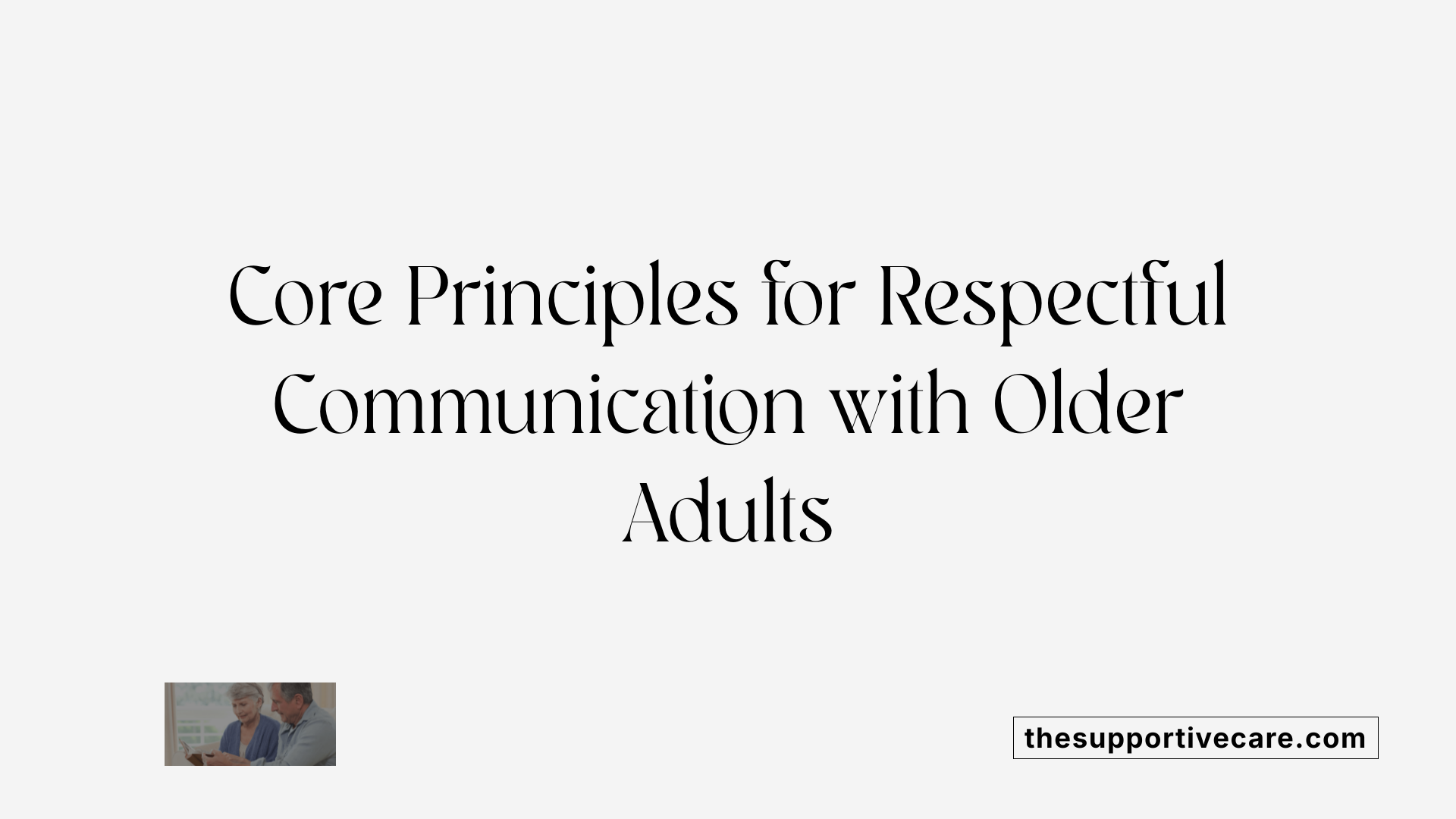
How can healthcare providers improve communication with older patients, especially during mental health crises?
Effective interaction begins with using respectful language and addressing elders politely, acknowledging their dignity and individuality. Incorporating a person-centered approach helps build rapport, allowing seniors to feel valued and understood. This involves actively listening, making eye contact, and demonstrating genuine interest in their concerns.
It is essential to avoid stereotypes or patronizing language often termed as 'elderspeak,' which can diminish a senior’s sense of independence. Instead, use clear and simple language tailored to their cognitive and sensory needs. Recognizing each patient’s cultural background and personal preferences further enhances communication, fostering an environment of trust and respect.
Moreover, involving family members or caregivers respectfully supports comprehensive understanding and helps reinforce health messages. For seniors experiencing mental health crises, these principles become especially important. Medical personnel should speak slowly, clearly, and with compassion, using visual aids or written summaries to supplement verbal exchanges.
Signs of cognitive impairment or emotional distress should be approached sensitively, adapting communication strategies accordingly. Creating a calm, distraction-free environment and being patient with pauses allows seniors to express themselves fully without feeling rushed or misunderstood.
In sum, respectful and culturally sensitive communication enhances care quality, promotes emotional well-being, and ensures seniors receive the support and understanding they deserve during challenging health situations.
Adapting Communication for Sensory and Cognitive Challenges
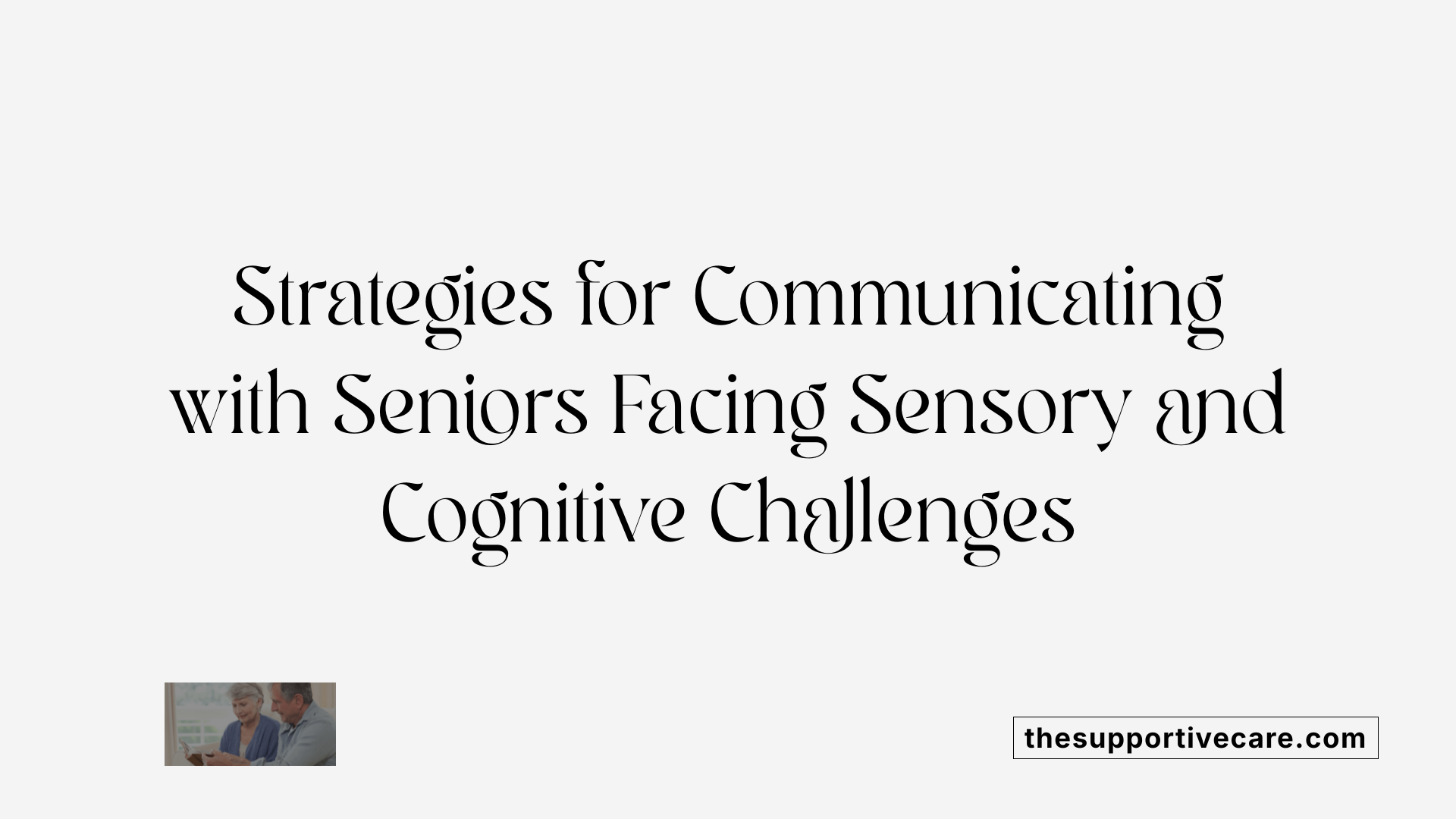
What strategies can be used to address sensory deficits and cognitive impairments in communication with older adults?
Effective communication with older adults facing sensory and cognitive challenges requires tailored, empathetic approaches. To address sensory deficits such as hearing and vision loss, healthcare providers should utilize assistive devices like hearing aids and glasses, ensuring they are fitted correctly and functioning well. Environmental modifications, such as improving lighting and reducing background noise, can significantly enhance understanding.
For individuals with hearing impairments, speaking clearly, facing the patient directly, and using amplification devices when available help facilitate comprehension. When visual impairments are present, ensuring adequate lighting, offering large-print materials, and providing information through audio formats support effective communication.
Cognitive impairments, such as those caused by dementia, necessitate simplifying language, avoiding complex instructions, and using visual aids like pictures, diagrams, or memory books. Repetition and the use of consistent routines can reduce confusion and anxiety.
Involving family members and caregivers plays a crucial role. Educating them about communication techniques and encouraging their participation can bolster social connectivity and reinforce health messages.
Creating a calm, familiar environment is vital. Reducing distractions, managing agitation through soothing techniques, and maintaining a composed demeanor help prevent misunderstandings and distress.
Overall, respectful, patient-centered communication—considering cultural, linguistic, and individual preferences—is essential. This approach, combined with appropriate adaptations and caregiver involvement, contributes to better interaction and health outcomes for older adults dealing with sensory and cognitive challenges.
Approaching Sensitive Topics with Care and Empathy
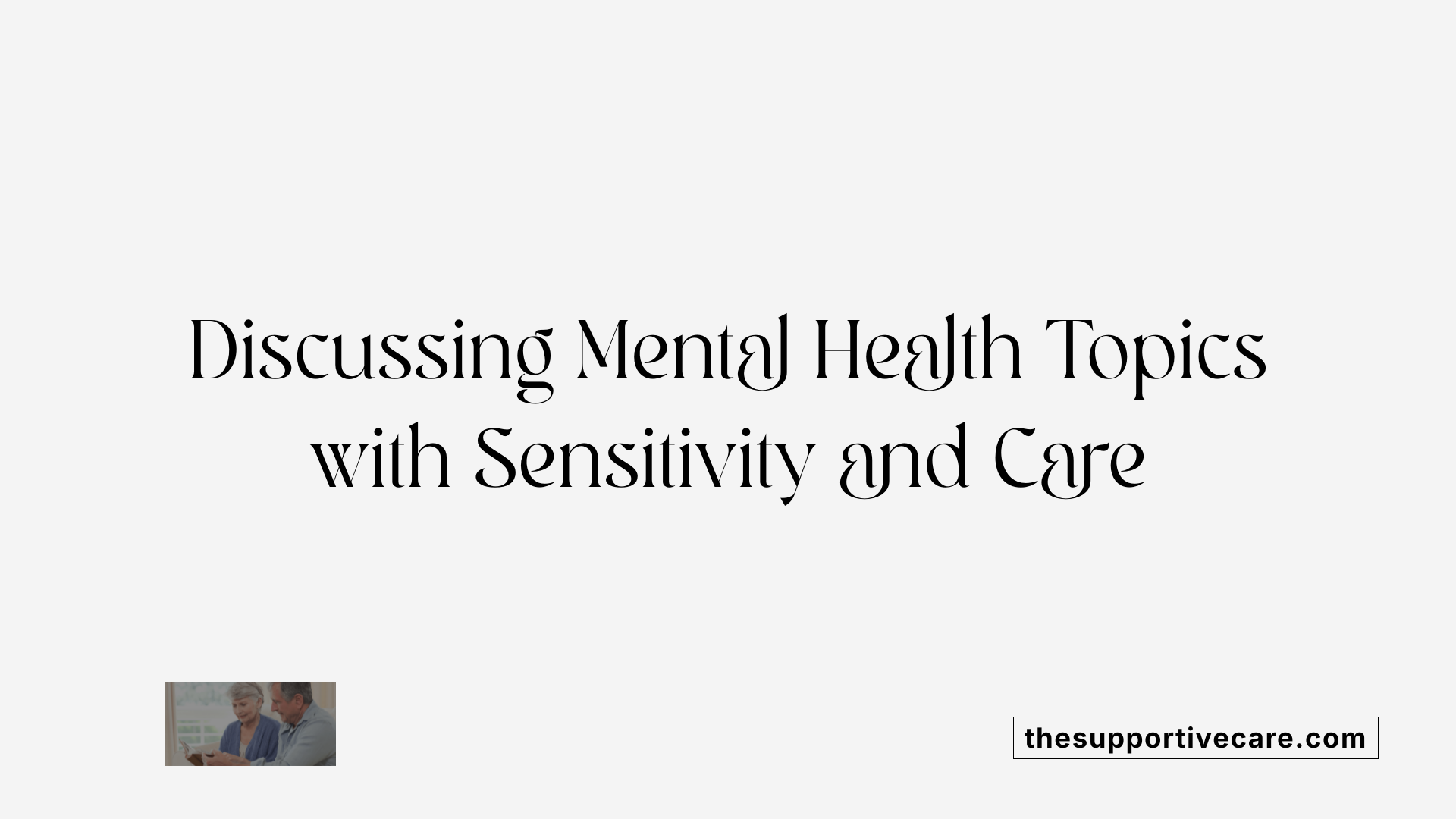 When engaging in conversations about sensitive mental health topics with older adults, it is crucial to approach the discussion with deliberate tact and compassion. Selecting an appropriate time and private setting can significantly influence the comfort level of the individual, allowing for an open and honest dialogue.
When engaging in conversations about sensitive mental health topics with older adults, it is crucial to approach the discussion with deliberate tact and compassion. Selecting an appropriate time and private setting can significantly influence the comfort level of the individual, allowing for an open and honest dialogue.
Using simple, jargon-free language helps prevent misunderstandings and reduces feelings of vulnerability. Normalizing the topic by framing it as a common concern experienced by many seniors can lessen feelings of stigma or shame. Employing a caring tone and actively involving the individual in the conversation foster trust and respect.
Involving family members or caregivers, when suitable, provides additional emotional support and reinforces understanding. However, it is essential to respect the patient's privacy and cultural beliefs throughout these interactions.
What are the best practices when discussing sensitive mental health issues with seniors?
When communicating with seniors about mental health concerns, it is important to approach the conversation with empathy and respect. Ensure the environment is private and comfortable to promote openness. Use clear, simple language to facilitate understanding and avoid medical jargon that may overwhelm or confuse.
Normalizing the discussion by framing issues as common concerns regarding aging or safety makes it easier for seniors to share their feelings. This approach, combined with active listening and attentive body language, reassures the individual that their feelings are valid.
Assess their readiness by selecting a suitable moment and providing reassurance throughout. If appropriate, involve family or caregivers to support the senior and help reinforce the information. Always remain sensitive to cultural differences, tailoring your approach as needed.
Research indicates that creating a non-threatening environment and fostering a collaborative discussion process are essential in effectively addressing mental health topics with older adults. By doing so, healthcare providers can build trust, improve engagement, and support better mental health outcomes.
Ensuring Compassionate and Respectful Communication
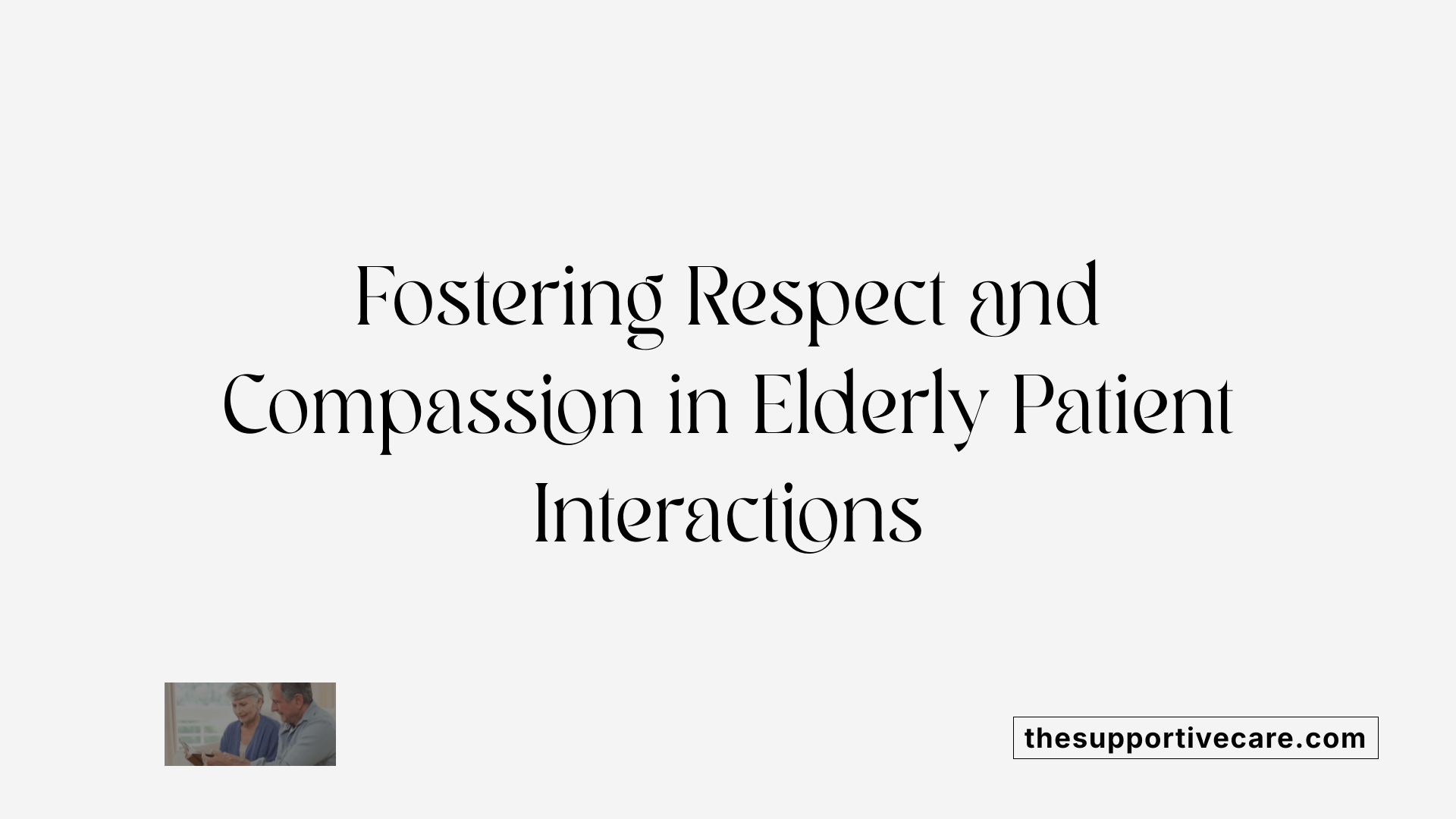 When interacting with older adults, particularly those facing mental health challenges, healthcare professionals play a vital role in fostering an environment of trust and dignity. Employing empathetic language—such as expressing understanding and compassion—lays the foundation for respectful dialogue. Active listening is equally important; giving seniors the full attention they deserve, maintaining eye contact, and using affirming gestures demonstrate genuine concern and facilitate open communication.
When interacting with older adults, particularly those facing mental health challenges, healthcare professionals play a vital role in fostering an environment of trust and dignity. Employing empathetic language—such as expressing understanding and compassion—lays the foundation for respectful dialogue. Active listening is equally important; giving seniors the full attention they deserve, maintaining eye contact, and using affirming gestures demonstrate genuine concern and facilitate open communication.
Respect for cultural backgrounds and personal preferences enhances the effectiveness of interactions. When professionals inquire about how seniors prefer to be addressed and acknowledge their cultural beliefs, it helps establish rapport and shows respect for individual identities. This tailored approach ensures that conversations are meaningful and considerate of each person’s unique perspective.
Creating a safe, non-judgmental setting encourages seniors to share their thoughts and feelings more comfortably. Using clear, simple language and avoiding medical jargon prevents misunderstandings. It is also crucial to recognize and validate emotions—whether frustration, fear, or sadness—and offer appropriate emotional support. This approach not only alleviates anxiety but also reinforces the senior’s sense of control and self-worth.
In practice, asking open-ended questions, allowing time for responses, and refraining from rushing or interrupting are essential strategies. These techniques nurture a sense of autonomy and respect, fostering a relationship built on trust. Caregivers and healthcare professionals should remain patient, flexible, and attentive to each senior’s sensory needs—such as using visual aids or amplification devices—thereby ensuring effective communication.
Overall, fostering compassion and respect through mindful, attentive interactions significantly improves mental health care outcomes. Such attentiveness affirms the senior’s dignity, facilitates honest dialogue, and supports their emotional well-being, forming the cornerstone of quality, person-centered care.
Training and Resources for Crisis Intervention
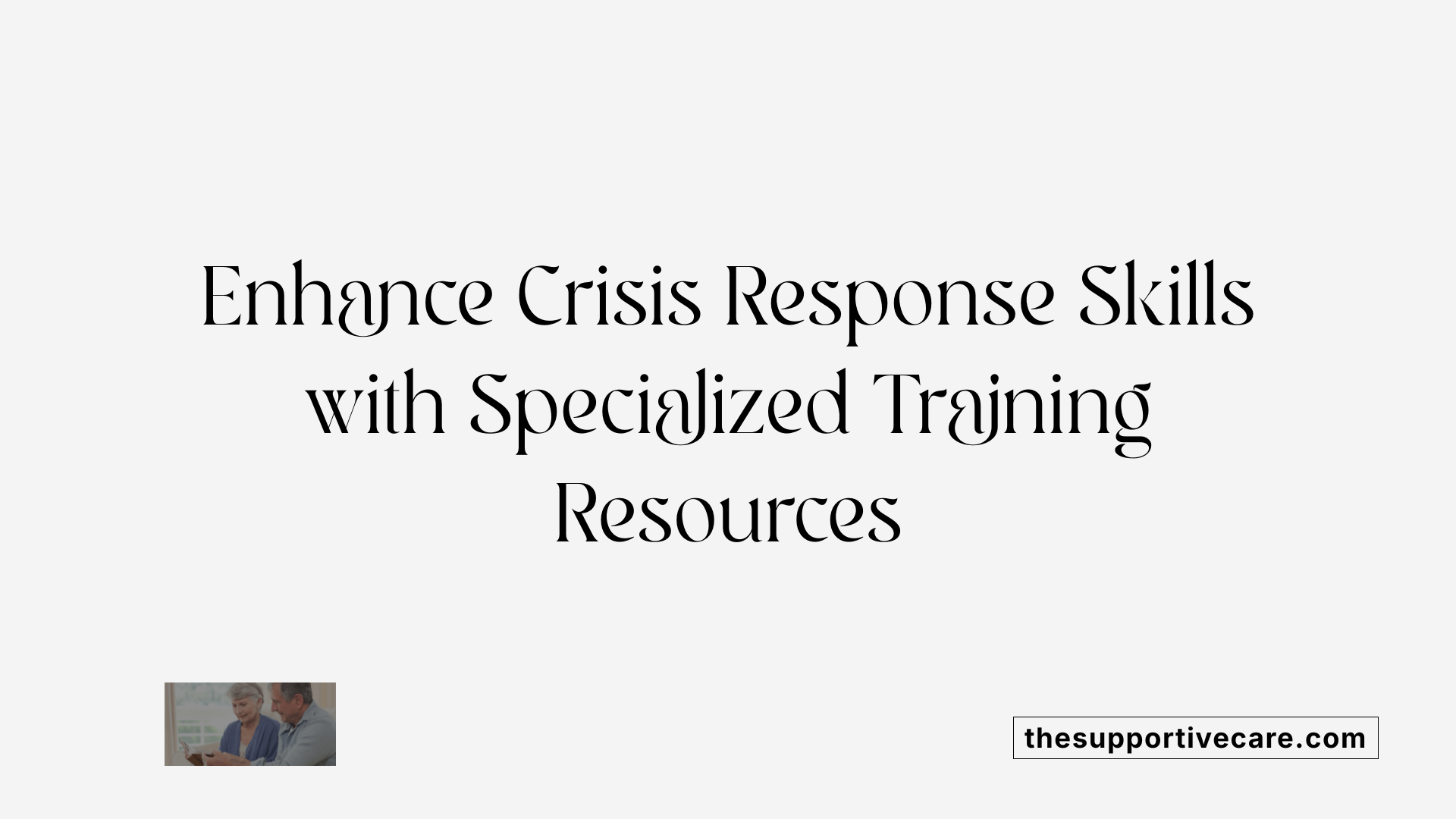 Efficient crisis intervention for older adults requires specialized training for healthcare providers, caregivers, and emergency personnel. Several programs and resources have been developed to improve their skills in managing behavioral health crises in this population.
Efficient crisis intervention for older adults requires specialized training for healthcare providers, caregivers, and emergency personnel. Several programs and resources have been developed to improve their skills in managing behavioral health crises in this population.
One prominent example is the Crisis Prevention Institute (CPI), which offers online dementia training certificates that focus on trauma-informed care, de-escalation techniques, and empathetic, person-centered approaches. These courses have been shown to improve behavioral responses and overall care quality in older adults.
Additional reputable resources include free courses such as 'Creating Safe Scenes,' tailored for first responders, which teach safe intervention methods to assist individuals in crisis. Simulation-based trainings from providers like Relias cover essential areas like crisis management, trauma-informed care, and suicide prevention, providing practical experience and confidence.
Healthcare teams and emergency responders also benefit from online tools—such as videos, tip sheets, and frameworks like the REACH model—that guide effective communication, environmental modifications, and de-escalation strategies during urgent situations.
Incorporating trauma-informed care, de-escalation techniques, and evidence-based interventions into training curricula ensures that those supporting older adults are well-prepared. Developing individualized crisis plans and providing ongoing education are vital for fostering safe, respectful, and effective responses.
Appropriate training enhances the ability of caregivers, medical staff, and first responders to address mental health symptoms, reduce agitation, and prevent escalation, ultimately promoting better outcomes for older adults experiencing crises.
For further exploration, searching terms like 'Crisis intervention training seniors' can provide additional current programs and resources dedicated to supporting this vulnerable group.
Supporting Families and Community Resources During Crises
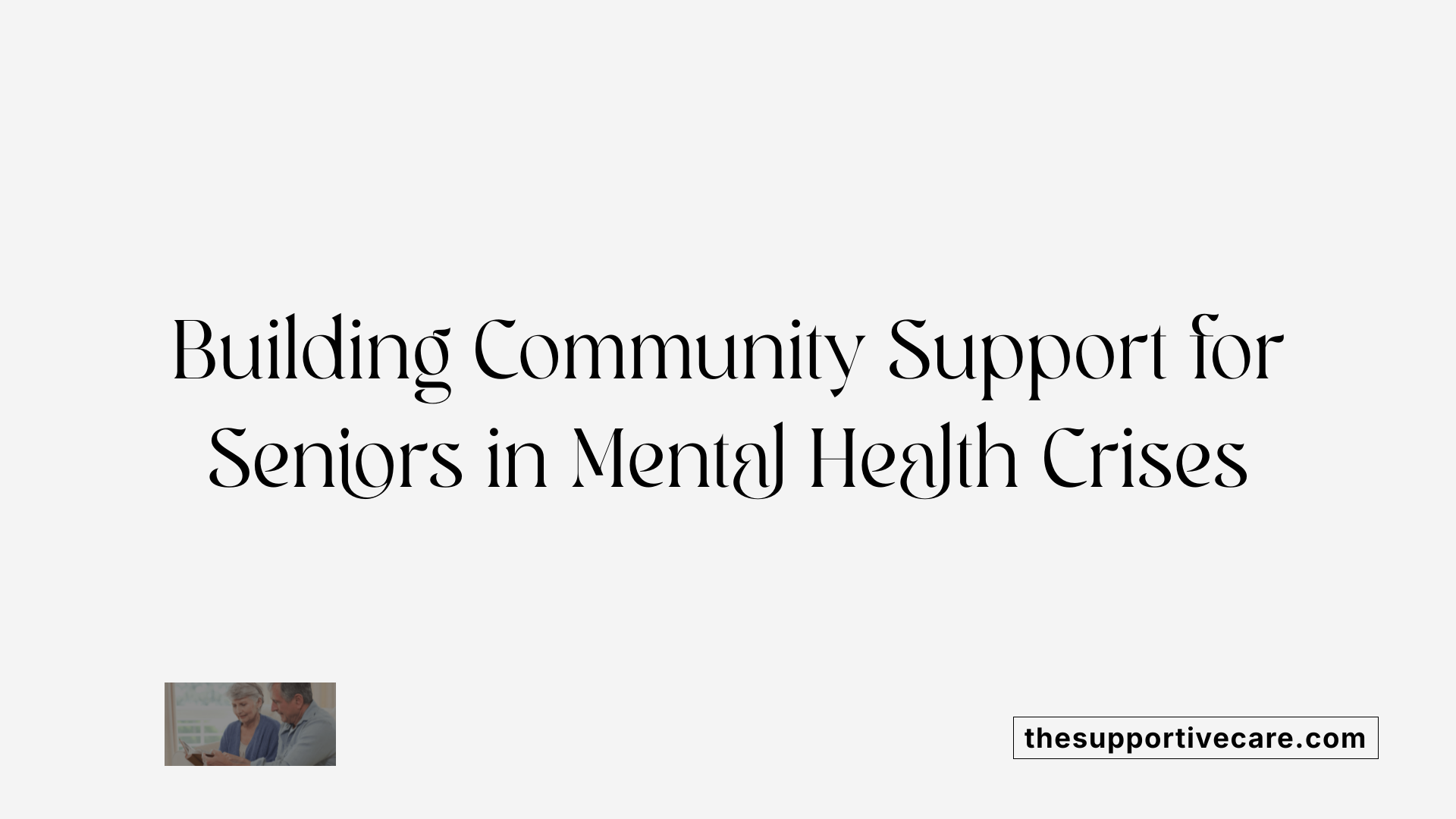
How can understanding and support be enhanced during mental health emergencies involving seniors?
Enhancing understanding and support during mental health crises among older adults requires a comprehensive approach involving education, collaboration, and resource utilization. Education campaigns aimed at caregivers, healthcare providers, and community members are vital in raising awareness of early warning signs such as agitation, withdrawal, or confusion. These initiatives equip key stakeholders with knowledge about effective intervention strategies, fostering a proactive response.
Utilizing available resources is essential. Crisis hotlines like the 988 Lifeline offer immediate support, while peer-support programs and specialized toolkits provide guidance tailored to seniors' unique needs. Training caregivers, staff, and emergency personnel to recognize symptoms common in cognitive impairments ensures timely and compassionate intervention.
Coordination across healthcare systems, community organizations, and emergency services creates a safety net that promotes safe, respectful, and personalized care. Incorporating community initiatives such as senior centers and mental health awareness days further raises visibility and provides spaces for support and information sharing.
These efforts collectively foster a supportive environment capable of addressing mental health crises effectively, promoting well-being, and safeguarding the dignity of older adults facing urgent emotional or psychological challenges.
Building a Framework for Compassionate and Effective Communication
The pathway to improving mental health outcomes for seniors relies heavily on adopting respectful, empathetic, and adaptable communication strategies. Healthcare providers, caregivers, and community organizations must continually enhance their skills through ongoing training, cultural competence, and evidence-based approaches. Recognizing and addressing sensory and cognitive challenges, handling sensitive topics with care, and fostering supportive environments can significantly reduce anxiety and stigma, and promote dignity. Moreover, leveraging community resources and educational tools ensures that older adults receive timely, tailored, and effective care during crises. Cultivating a compassionate communication culture is essential not only for immediate crisis resolution but also for long-term mental wellness and quality of life for seniors.
References
- Talking With Your Older Patients | National Institute on Aging
- 10 Strategies for Communicating Effectively With Senior Care ...
- Working With Older Adults - American Psychological Association
- Quality communication can improve patient-centred health ...
- [PDF] Communicating With Older Adults - Lasell University
- Tips For Stigma-Free Communication About Mental Health - CDC
- Behavior Health for Professionals - National Council on Aging
- 7 Tips for Improving Communication with Senior Citizens
- Communication strategies - Health Victoria


































































































